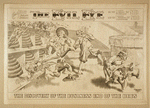"At bedtime, instead of my charming boy, ... I found a lifeless corpse--laid out in the white robes of innocence and death. Though I wept and pressed him, he could not look at me. How could I endure it--much less compose myself--but by believing him gone to perfect rest and happiness.--there to wait for his father and mother."
---Diary of Louisa Park, qtd. in Robin Jaffee Frank's Love and Loss: American Portrait and Mourning Miniatures (2000). Frank accredits Louisa Park's diary entries for Dec 14 and 24, 1800 (American Antiquarian Society, Worcester, MA) and quotes from Nancy Schrom Dye and Daniel Blake Smith, "Mother Love and Infant Death, 1750-1920" Journal of American History 73 (September 1986), 332.
I have selected this quote from Robin Jaffee Frank's superb volume on portrait and mourning miniatures, a book that elegantly traces the history of this artistic and decorative form. This particular quote does not reference the portrait (or the material culture of mourning) that are the subjects of Frank's book, but it does suggests the sentimental underpinnings of the early nineteenth century that located comfort in portrait miniatures, hairwork, and other relics of the dead. What draws me to this quote, however, is the way that it captures the univeral aspect of grief --the seeming impossibility of "enduring" loss. The death of a child disrupts the natural order of things and cannot be fathomed. The acceptance of death that marked an earlier era gives way to the more reassuring promise of reunion between mother and child.
In my title, I tip my hat to the late blogger, Cancer Baby who died from ovarian cancer in May of 2006 at the age of 33. Her entry "(M)otherlove" a poem that documents her own mother's stunned --yet silent reaction--to her question, "What will you do if I die?" comes to mind as I work through Frank's art history work.
Monday, December 28, 2009
Subscribe to:
Post Comments (Atom)






No comments:
Post a Comment